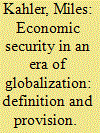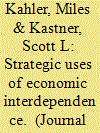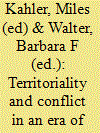| Srl | Item |
| 1 |
ID:
058989


|
|
|
| 2 |
ID:
144462


|
|
|
| 3 |
ID:
160055


|
|
|
|
|
| Summary/Abstract |
Since the end of Cold War, three sets of actors have produced change in global governance, change that could be threatening and transformative for existing global governance institutions and the future of international cooperation. Three alternative futures have emerged: fragmentation, stagnation, and transformation. Emerging powers—and some established powers—have promoted new regional institutions that offer useful competition but also the threat of fragmentation. Divergence of preferences between emerging and incumbent powers have also produced stagnation, but the greatest threat of stagnation has come with the rise of populist and nationalist movements that have now found a voice in two powerful countries, the U.S. and the U.K. Finally, non-state and subnational actors have produced new modes of governance, in which national governments and intergovernmental organizations play a reduced, though often strategic role. United States withdrawal from or disruption of global governance would alter the likelihood that these futures will emerge.
|
|
|
|
|
|
|
|
|
|
|
|
|
|
|
|
| 4 |
ID:
120543


|
|
|
|
|
| Publication |
2013.
|
| Summary/Abstract |
Economic convergence of the large emerging economies (Brazil, China and India) on the incumbent industrialized economic powers has produced divergent predictions: rising powers are viewed as challengers of existing global governance or nascent supporters of the status quo. The preferences of rising powers, as revealed in global economic negotiations and international security regimes, indicate that they are moderate reformers that seek greater influence within existing forums and also attempt to safeguard their policy-making autonomy.
Even if their preferences change, the translation of growing economic weight into usable capabilities is not automatic. Domestic political constraints often make the mobilization of capabilities difficult in international bargaining. Strategies of collective action, whether South-South or regional, have not yet produced a consistent increase in bargaining power at the global level.
The counter-strategies of delay and cooptation implemented by the incumbent powers have maintained incumbent influence and enhanced the legitimacy of existing global governance institutions. Risks of conflict remain along three negotiating divides: system friction, distributional conflict and institutional efficiency.
Institutional innovations such as greater transparency, institutional flexibility and construction of informal transnational networks may provide modest insurance against a weakening of global governance and its institutions.
|
|
|
|
|
|
|
|
|
|
|
|
|
|
|
|
| 5 |
ID:
073578


|
|
|
|
|
| Publication |
2006.
|
| Summary/Abstract |
While the determinants and effectiveness of economic sanctions have been the subject of a substantial and growing literature in international relations, much less attention has been given to economic engagement strategies, where a country deliberately expands economic ties with an adversary to change the target's behavior. This article develops a theoretical framework that distinguishes between three types of engagement strategies: conditional policies that directly link economic ties to changed behavior in the target state; unconditional policies where economic interdependence is meant to act as a constraint on the behavior of the target state; and unconditional policies where economic interdependence is meant to effect a transformation in the foreign policy goals of the target state. The article presents several hypotheses concerning the conditions facilitating or hindering the successful implementation of these different strategies, and then examines engagement policies adopted by three East Asian states: South Korea, Taiwan, and mainland China. The cases offer preliminary confirmation of at least three of the hypotheses: conditional strategies are less likely to succeed when the initiating state is a democracy; transformative strategies are more likely to succeed when the target state is a democracy; and transformative strategies are more likely to succeed when a broad consensus exists in the initiating state.
|
|
|
|
|
|
|
|
|
|
|
|
|
|
|
|
| 6 |
ID:
071919


|
|
|
|
|
| Publication |
Cambridge, Cambridge University Press, 2006.
|
| Description |
xii, 340p.
|
| Standard Number |
0521675030
|
|
|
|
|
|
|
|
|
|
|
|
Copies: C:1/I:0,R:0,Q:0
Circulation
| Accession# | Call# | Current Location | Status | Policy | Location |
| 051263 | 341.42/KAH 051263 | Main | On Shelf | General | |
|
|
|
|